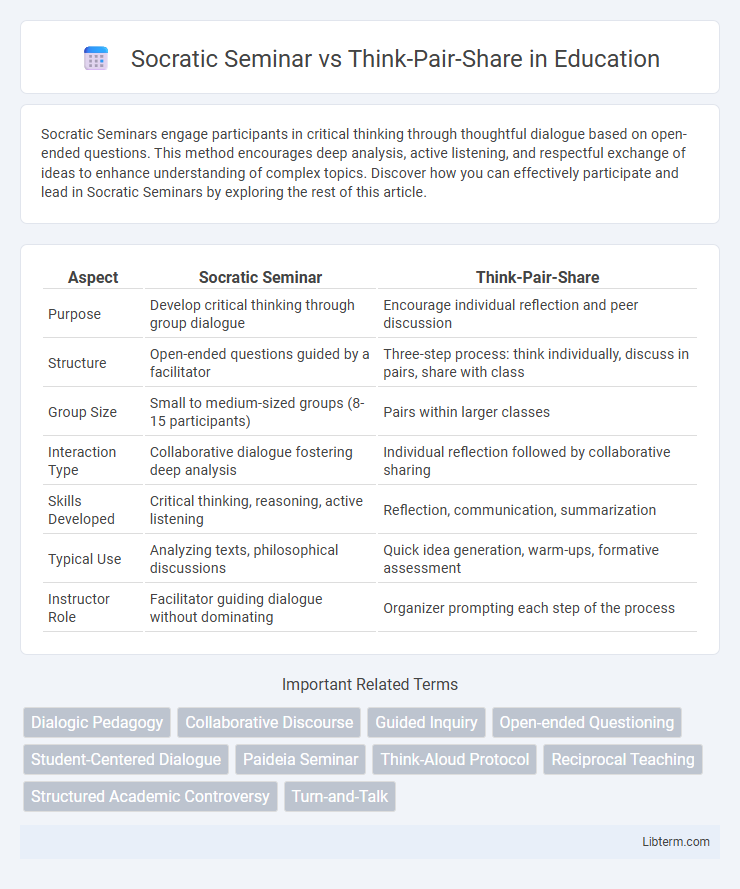Socratic Seminars engage participants in critical thinking through thoughtful dialogue based on open-ended questions. This method encourages deep analysis, active listening, and respectful exchange of ideas to enhance understanding of complex topics. Discover how you can effectively participate and lead in Socratic Seminars by exploring the rest of this article.
Table of Comparison
| Aspect | Socratic Seminar | Think-Pair-Share |
|---|---|---|
| Purpose | Develop critical thinking through group dialogue | Encourage individual reflection and peer discussion |
| Structure | Open-ended questions guided by a facilitator | Three-step process: think individually, discuss in pairs, share with class |
| Group Size | Small to medium-sized groups (8-15 participants) | Pairs within larger classes |
| Interaction Type | Collaborative dialogue fostering deep analysis | Individual reflection followed by collaborative sharing |
| Skills Developed | Critical thinking, reasoning, active listening | Reflection, communication, summarization |
| Typical Use | Analyzing texts, philosophical discussions | Quick idea generation, warm-ups, formative assessment |
| Instructor Role | Facilitator guiding dialogue without dominating | Organizer prompting each step of the process |
Introduction to Socratic Seminar and Think-Pair-Share
Socratic Seminar is a collaborative discussion method that emphasizes critical thinking and deep analysis through open-ended questions, encouraging participants to explore complex ideas by referencing texts or evidence. Think-Pair-Share is a structured collaborative learning strategy where students first think independently about a question, then discuss their thoughts with a partner, and finally share with the larger group, promoting active engagement and comprehension. Both techniques foster active participation but differ in format, with Socratic Seminars focusing on whole-group dialogue and Think-Pair-Share emphasizing incremental sharing stages.
Historical Background and Origins
The Socratic Seminar originated from the teaching methods of Socrates in ancient Greece, emphasizing critical thinking and dialogue through questioning. Think-Pair-Share was developed in the 1980s by educational researcher Frank Lyman to promote student collaboration and active learning in classrooms. Both strategies reflect evolving pedagogical approaches aimed at enhancing student engagement and comprehension through structured interaction.
Structure and Format Comparison
Socratic Seminar follows a structured dialogue format where participants engage in open-ended, critical discussions based on a text, promoting deep analysis and collective inquiry through guided questioning. Think-Pair-Share employs a three-step process: individuals first contemplate a question, then discuss their thoughts with a partner, and finally share insights with the larger group, emphasizing collaborative learning and rapid idea exchange. The Socratic Seminar encourages extended, text-based dialogue within a whole group, while Think-Pair-Share focuses on quick, iterative interactions moving from individual reflection to group sharing.
Key Objectives and Learning Outcomes
Socratic Seminar emphasizes critical thinking and dialogue by encouraging students to analyze texts deeply and articulate their interpretations verbally. Think-Pair-Share aims to promote individual reflection and collaborative learning by having students first think independently, then discuss with a partner, and finally share with the larger group. Both methods enhance comprehension and communication skills but differ in interaction style and depth of discourse.
Role of the Teacher in Each Method
In a Socratic Seminar, the teacher acts as a facilitator, guiding discussion with open-ended questions while encouraging students to explore ideas deeply and critically. In Think-Pair-Share, the teacher structures the activity by posing a question, allowing individual thinking, pairing students for discussion, and then leading a whole-class sharing session. Both methods leverage the teacher's role to promote student engagement, but Socratic Seminars emphasize nurturing dialogue and critical thinking, whereas Think-Pair-Share focuses on collaborative learning and immediate feedback.
Student Engagement and Participation
Socratic Seminar fosters deep student engagement through open-ended questioning, encouraging critical thinking and active listening among all participants. Think-Pair-Share promotes participation by allowing students to first reflect individually, then discuss with a partner, and finally share with the larger group, increasing confidence and inclusivity. Both strategies enhance interactive learning but differ in group dynamics, with Socratic Seminar relying on whole-class dialogue and Think-Pair-Share emphasizing collaborative peer interaction.
Strengths and Limitations
Socratic Seminars promote deep critical thinking and encourage open dialogue by engaging participants in reflective questioning, but they may be intimidating for introverted students and require strong facilitation skills. Think-Pair-Share fosters collaborative learning and allows all students to contribute ideas in low-pressure settings, making it effective for inclusive participation, though it may limit the depth of discussion compared to Socratic Seminars. Both strategies enhance student engagement but vary in their ability to develop higher-order thinking and manage group dynamics.
Suitable Subjects and Learning Environments
Socratic Seminar is highly suitable for humanities subjects like literature, philosophy, and history, where critical thinking and deep textual analysis are essential. Think-Pair-Share thrives in STEM and language classrooms, promoting collaborative problem-solving and verbal practice in smaller, interactive settings. Socratic Seminars benefit from larger, discussion-friendly environments, while Think-Pair-Share is effective in diverse classrooms requiring quick idea exchange and peer feedback.
Assessment and Evaluation Approaches
Socratic Seminar emphasizes formative assessment through open-ended questioning and group dialogue that fosters critical thinking and oral reasoning skills, often evaluated via rubrics assessing participation, depth of analysis, and evidence use. Think-Pair-Share incorporates both formative and summative assessment, allowing teachers to gauge individual understanding quickly through pair discussions and share-out segments, with evaluation focusing on clarity, collaboration, and conceptual grasp. Both methods facilitate real-time feedback, but Socratic Seminar prioritizes qualitative assessments of reasoning, while Think-Pair-Share allows for more immediate, diverse evidence of student comprehension.
Deciding the Best Approach: Socratic Seminar vs Think-Pair-Share
Choosing between Socratic Seminar and Think-Pair-Share depends on the desired depth of discussion and student interaction. Socratic Seminars foster critical thinking and in-depth dialogue through open-ended questioning, ideally suited for analyzing complex texts. Think-Pair-Share enhances collaborative learning and immediate feedback by encouraging students to reflect individually, discuss with a partner, and then share with the larger group, making it effective for quick idea development and diverse perspectives.
Socratic Seminar Infographic

 libterm.com
libterm.com